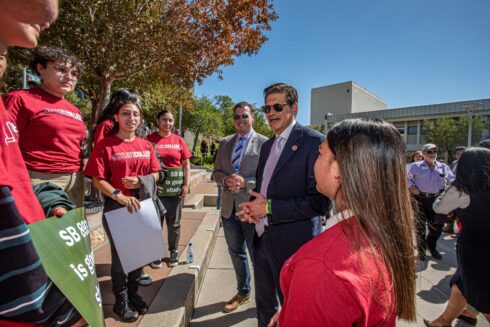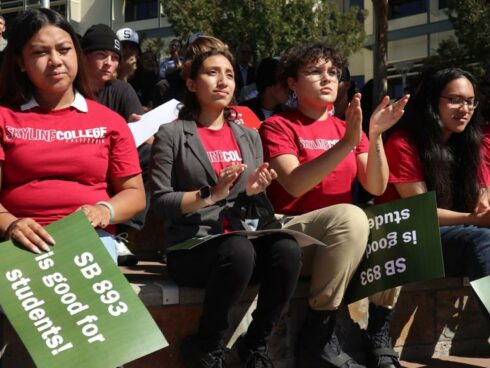The article below originally appeared in the San Mateo Daily Journal and is being reprinted with permission.

State Sen. Josh Becker, D-San Mateo, with students after a rally in support of his legislation to make community college free in San Mateo County. Photo by Gino De Grandis.

Students listen to speakers at Cañada College during the rally. Photo by Sierra Lopez.
Students and local officials gathered at Cañada College Thursday to rally in support of Senate Bill 893, a measure currently awaiting Gov. Gavin Newsom’s signature that, if signed, would allow the San Mateo County residents to attend community college here for free.
“This is an idea whose time has come because it’s all about our students and giving them access to higher education,” said state Sen. Josh Becker, D-San Mateo. “It puts students first. It gives them more opportunities to succeed in education, in life, in their careers and in their futures.”
Thursday’s rally at Cañada College was held as both a rally calling on Newsom to sign SB 893 and a celebration of the work officials put in to get the bill pushed through both state legislative bodies with full support.
Under SB 893, crafted by Becker with support from Assembly Speaker pro Tem Kevin Mullin, D-South San Francisco, and State Assembly Marc Berman, D-Palo Alto, the state would allow the San Mateo County Community College District to waive a mandatory $46-per-unit enrollment fees for nearly 6,000 San Mateo County residents, allowing those interested in enrolling in classes at one of the community college district’s three campuses to attend for free.
Students who prove financial need by completing a Free Application for Federal Student Aid form or a version of the form for undocumented residents would also be exempt from paying health, student body, student representation, student union, inclusive access and materials fees.
SB 893 would expand on the district’s established efforts to make community college accessible to underserved students through its Promise Scholars Program which offers about 2,000 students districtwide financial, counseling and academic support.
Anthony Leon Chumpitazi, a third year Cañada College student and a Promise Scholar, said the program has helped him navigate the intimidating world of higher education, set him on a path toward achieving his dream of attending University of California, Los Angeles where he plans to study neuroscience, all while helping him and his mother afford basic needs like groceries and transportation.
“I was scared and thankfully I found the Promise Scholar Program,” Chumpitazi said. “I really enjoy Cañada College and the programs and everything and if it can be passed on to other students that would be great.”
Enrollment fees to attend community college in the state have not always been a part of the institution’s history, Chancellor Mike Claire and Trustee John Pimentel noted during Thursday’s event. When they attended community college in the early ’80s, Claire at Cañada College and Pimentel at San Joaquin Delta Community College, neither of them paid enrollment fees, they said.
Pimentel said his experience in community college set him on a path to earning his bachelor’s degree from University of California, Berkeley and a master’s degree from Harvard Business School while Claire noted free community college allowed him to independently pay for his final two years of undergraduate studies.
“If I had that advantage 42 years ago, our students today should have that very same advantage so we’re 100% behind you,” said Claire, a second-generation community college student in the district.
When the state began discussions around mandating enrollment fees in 1985, Pimentel said he was part of a student group that rallied against the move. That effort failed but nearly 40 years later SB 893 cleared the legislative process without a single no vote, Pimentel noted, indicating strong support for their mission of making community college accessible to all who want to attend, regardless of economic status.
Tuition waivers were not initially an easy sell though, noted Becker, a former adjunct professor in the district. An initial version of the bill sought to do away with community college tuition fees in multiple jurisdictions but that measure failed during the previous legislative session.
Determined to get a version of the bill passed, Becker said he and his team decided to create a piece of legislation that was “laser focused” on giving San Mateo County residents the opportunity to attend community college for free without additional state funds or local taxes.
The district has set aside $6 million in the 2022-23 budget for the program’s implementation which is expected to cost about $4.7 million next semester, Dr. Richard Storti, executive vice chancellor for Administrative Services, said during a meeting in late August. San Mateo County supervisors also allocated $2 million toward the effort.
During the summer, district trustees also agreed to waive student health and parking fees and parking permit citations for the 2022-23 school year, saving students between $700,000 and $770,000 combined, according to a press release. That initiative was finalized by the board early this month when it adopted an updated budget in which $2 million was allocated toward offsetting revenue loss from the program.
“Dismantling the large and rising wall of college costs and breaking down barriers to access is a top priority for our board,” Pimentel said, lauding Vice Chancellor Mitch Bailey for his work in developing and lobbying for the bill. “I believe community college is the most efficient and effective investment of government resources to achieve social and economic equity.”